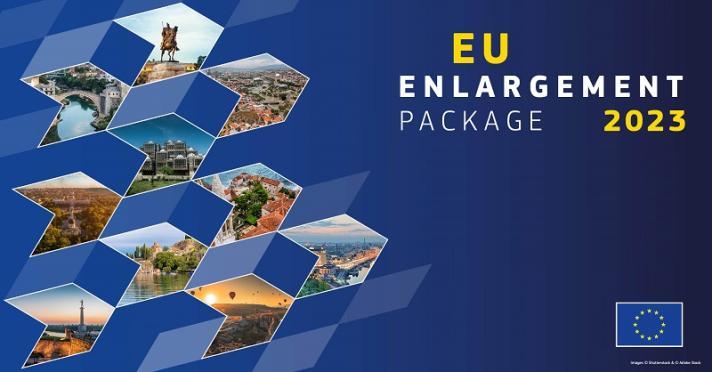HRVP Borrell: the EU enlargement policy is a driving force for peace, security and prosperity for our continent

The Report covers a broad range of important policy areas and focuses on the implementation of fundamental reforms, such as the rule of law and fundamental rights, which are at the core and determine the pace of the EU accession negotiations. The Report also provides guidance on the reform priorities ahead.
The HRVP commented:
This is a historic Enlargement Package, for the first time with our 10 closest partners lined up for EU membership. Completing our Union is the best investment in peace, security and prosperity for our continent and this year’s package sets out major steps forward. EU membership is a strategic choice and alignment with the EU’s common foreign and security policy is a more significant signal than ever of shared values and strategic orientation.
Ukraine, Moldova and Georgia
For years, the people of Ukraine, Moldova and Georgia have been calling for the security, stability and prosperity that they know the EU integration can bring. They are the driving force behind the political will and efforts invested in running deep, transformational reforms in these countries. Russia’s brutal war against Ukraine and malign influence in the region made the imperative of accelerating the enlargement process even more urgent. In less than two years, these three countries applied for EU membership, were granted candidacy status and, in the case of Moldova and Ukraine, may very soon start accession negotiations. In these troubled times, citizens of the EU, Georgia, Moldova and Ukraine have a reason for joy and hope.
Bosnia and Herzegovina
According to the Report: the Commission recommends the opening of accession negotiations with Bosnia and Herzegovina once the necessary degree of compliance with the membership criteria is achieved. The country needs to apply further efforts to fulfil the key priorities set out in the Commission Opinion on its EU membership application. The Commission will continuously monitor the progress and compliance in all areas related to the opening of negotiations and report to the Council at the latest in March 2024.
High Representative/Vice President Borrell stated:
Since I became EU High Representative/Vice-President, I have worked to ensure that Bosnia and Herzegovina can count on the EU. We are and remain fully committed to the unity, territorial integrity and sovereignty of Bosnia and Herzegovina.
And added:
Last year, we granted the EU candidate status and today we are recommending the Council to open the accession negotiations with Bosnia and Herzegovina, provided that the leaders grasp this opportunity and deliver on the key priorities and EU reform agenda. Our recommendations answers to the clear demands from the citizens of Bosnia and Herzegovina to live in dignity, peace, justice and prosperity. Today’s recommendation should serve as a political signal and drive for positive changes, which citizens of Bosnia and Herzegovina deserve.
Türkiye
The Report states that Türkiye remains a key partner for the European Union and a candidate country, but accession negotiations remain at a standstill since 2018, in line with the decision of the European Council. Cooperation in areas of common interest continues, but Türkiye needs to take decisive steps to significantly improve alignment with the EU's common foreign and security policy and step up cooperation on preventing and detecting circumvention of restrictive measures.
Alignment to EU foreign and security policy
The Report refers to Russia’s war of aggression against Ukraine, which has further underlined the need for unity and solidarity among the EU and its closest partners and thus the importance of a common foreign and security policy (CFSP) alignment in the enlargement process.
As the HRVP stressed:
The alignment with the EU’s common foreign and security policy is a more significant signal than ever of shared values and strategic orientation in the new geopolitical context.
Foreign Information Manipulation and Interference (FIMI) and Disinformation
According to the Report, hybrid threats, including foreign information manipulation and interference (FIMI), disinformation, and cyberattacks, remain a political and security challenge for the enlargement countries.
When it comes to FIMI and Disinformation, those have increased significantly since last year. As the Russian full-scale invasion in Ukraine developed, so did the spreading of different Kremlin narratives in the enlargement countries, with varying results. These are particularly effective in Serbia, where part of the local media and some mainstream political forces disseminate pro-Russian narratives, including throughout the Western Balkan region.
Following the decision to recognise a European perspective to Ukraine, Moldova and Georgia as well as to grant candidate status to Moldova and Ukraine, these three countries have been the target of a new wave of FIMI campaigns, mainly aiming to discredit aspirations to join the EU and blame the West for the current situation in the region. In Georgia, a specific strand of disinformation attempted to imply that the West seeks to open a ‘second front’ against Russia from Georgia. More active debunking by the authorities would be opportune.
Next steps in the enlargement process
The Council will now consider the Commission’s recommendations and take decisions on the steps ahead.
Growth Plan for the Western Balkans
The Commission presented today a new Growth Plan for the Western Balkans to bring some of the benefits of membership to the region in advance of accession, boost economic growth and accelerate the socio-economic convergence. The Plan includes €6 billion in grants and loans to enable partners to step up reforms and investments. The Plan stresses the importance of accelerating the fundamental reforms, (including judiciary and fundamental rights, justice, freedom and security, public procurement…). Payments will happen only after the fulfilment of agreed reforms.





